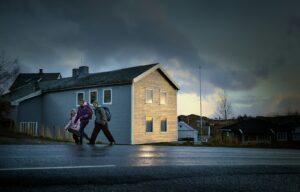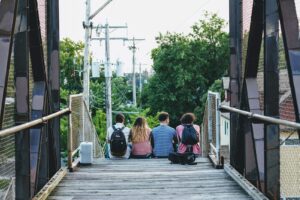The lives of adults with learning disabilities and their carers are still a long way from returning to normal despite Covid-19 restrictions lifting, according to a major study tracking their experiences during the pandemic.
The research, led by Manchester Metropolitan University and the University of Warwick, found that over half of adults with learning disabilities remain worried to leave the house and more than one in five with profound and multiple learning disabilities are still shielding.
The level of support received has also not returned to pre-pandemic levels. One in five adults with learning disabilities say they are getting less support now than before, with almost half of carers reporting the same thing. Many are now paying for some services out of their own pocket.
The pandemic is having a prolonged impact on carers too, with a majority of family carers and support staff reporting disturbed sleep, high stress, and tiredness as a result of their caring responsibilities. Many are unsure when the life of the person they care for will return to what it was.
The research was conducted with more than 750 people in the UK. Researchers interviewed 489 adults with learning disabilities (known as Cohort 1) and family carers and support staff from a further 280 adults with learning disabilities who could not take part in an interview themselves (known as Cohort 2).
The findings reveal that many are still living restricted lives despite overwhelmingly doing their bit to help control the pandemic. Most adults with learning disabilities are still wearing masks in public, more than nine out of 10 have had both doses of the Covid-19 vaccine, and the same again are willing to receive a booster vaccine.
Professor Chris Hatton, co-lead researcher and professor in social care at Manchester Metropolitan University said: ‘These findings highlight how important it is that the experiences of people with learning disabilities are listened to.
‘While they and their carers have been playing their part in keeping themselves and other people safe, many people’s lives are still highly restricted with no sign of this getting better.
‘The blanket lifting of restrictions has brought new freedom to lots of people across the country as society looks to ‘return to normal’. But it’s important to realise that this is not equal for everyone – and can actually be curtailing people’s freedoms rather than increasing it.
‘It’s clear that many people with learning difficulties feel uncomfortable and unsafe returning to the life they led before. Want they actually want is clear action on public health measures, such as masks in indoors space and vaccinating support workers, so they too can once again live, work and have fun.’
Professor Richard Hastings, co-lead researcher from the Centre for Educational Development, Appraisal and Research at the University of Warwick, said: ‘People with learning disabilities and those supporting them have completed their side of a social contract throughout the pandemic, often at great personal cost. Society’s side of this social contract is not being fulfilled, and people and families are in danger of being forgotten as society opens up.’
Belief that some restrictions should still be in place is high among both cohorts, with over three quarters in each group expressing this desire.
The research published today is the final set of findings from the Coronavirus and People with Learning Disabilities Study, which has tracked the experiences and views of adults with learning disabilities throughout the pandemic. The interviews for this wave of research took place in July and August this year.
Sandy Stark, a member of the advisory group for the study in Scotland said: ‘This has been a really important study to find out the experience of people with learning disabilities through the pandemic.
“I was part of the recruitment process to find people with disabilities to take part in the study. I felt this was really important, so no one felt like they were left out by having a disability. I also felt this was really important that everyone has a voice.
‘For me, there have been lots of opportunities to meet people and do things over Zoom, like helping with the study.
‘But it’s really upsetting to know that lots of people are still not getting the support they need. I hope that decision-makers will listen to the findings and make sure people can get their support back, and feel safe that they are not at risk of Coronavirus.’
Brenda Garrard, family support director for PAMIS in Grampian, an organisation that works with people with profound and multiple learning disabilities in Scotland, said: ‘It is welcome that almost all people with a learning disability have now been vaccinated but a significant number of people with learning disabilities have experienced negative impact on their physical and mental health.
‘Similarly, families caring for a person with profound disabilities have had to keep their relative at home with little or no support. The findings of this study must be acknowledged and considered by those tasked with ensuring that people with learning disabilities at all levels, and their carers, are better supported in the future.
‘As one parent of a young person with profound and multiple learning disabilities said: “We waited for the cavalry but the cavalry never came.’
The study is funded by UK Research and Innovation (Medical Research Council), and supported by the Department for Health and Social Care (National Institute for Health Research).
Photo Credit – Kristina Tripkovic















Leave a Reply